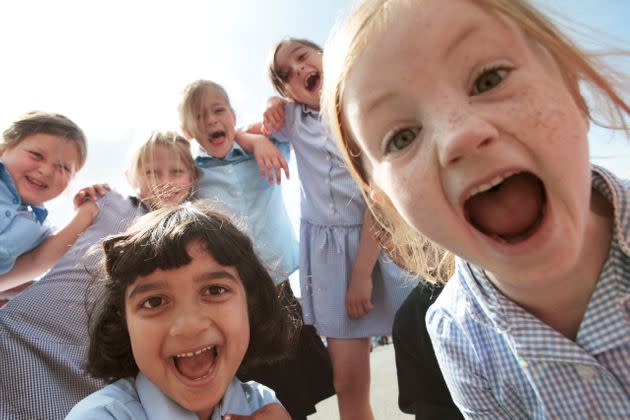Meet The Mums Making School Uniforms Affordable For All

(Photo: Peter Cade via Getty Images)
Every year, as September draws near, parents are faced with the nauseating prospect of finding and paying for new school uniform.
It now costs almost £100 on average to get your child fully kitted out for the year in compulsory uniform, according to the consumer watchdog Which? – while for independent (or private) schools, it can cost anywhere up to £750.
While lots of uniform basics can be bought on the high street, most schools still require specialty items like jumpers with school crests, blazers and PE kits, which can rack up an expensive bill.
Jane Gossling, who has a 10-year-old son, recalls how the summer holidays would end and she’d be left panicking over the prospect of all the new uniform she needed to buy.
“I was shocked the first time I bought school uniform,” she tells HuffPost UK.

Jane and Simon Gossling (Photo: Supplied)
Gossling, who lives in Cheltenham, says when her son first started school, he would have multiple growth spurts which would mean she’d have to replace his school uniform three times per school year. When you think that uniform is typically required from reception through to Year 11 – that’s an eye-watering expense over a number of years.
“We were feeling the pinch,” Gossling says, “and we knew that other parents were too – so we started looking at alternative options.”
The 49-year-old and her husband Simon, 47, set up Uniformerly, a website enabling parents to sell old school uniform and supplies (think school bags, musical instruments and sports equipment) to other parents at cheap rates: we’re talking from as little as 50p, with many items selling for around £1 to £3.
Since its inception in lockdown, the site has facilitated the sale of thousands of items – and that’s increasing every day. The cost of living crisis has upped sales, she says. Plus, people are more interested in sustainability now and “not so scared of the word ‘secondhand’”.
The site, which she runs full-time but doesn’t earn commission from, was born out of Gossling’s desire to buy affordable school uniform, but also a need for convenience. Parents have been swapping uniforms in person via school ‘swap shops’ for a number of years now, but even these have their limitations: not all schools host these events and even those that do operate limited opening hours, meaning some parents are unable to attend as they’re at work.
Some schools sell secondhand items to parents, but Gossling felt there was a lack of availability. Her son’s school, for example, had a secondhand uniform shop that would open once in a while, and she would turn up not knowing what they had in stock. When she did get to browse the rails she noticed they had very little in his size. “It was a bit frustrating,” she admits.
On top of that, cheaper uniform offerings from the high street are often seasonal, so buying new clothes mid-way through term was always an issue.
Buying from the high street can also leave a sour taste for parents who don’t want to fund fast fashion, but are struggling to afford brand new, more sustainable options.
Lisa Taylor, 51, who is based in Surrey, founded Uniformis in 2019, off the back of a desire to see fewer school clothes ending up in the bin. Research suggests 1.4 million uniforms end up in landfill each year.
She too says the cost of living crisis has caused demand to jump up. “Where we started off leaning very much towards the environmental concern, obviously that has just been overshadowed in recent months by parents looking for the financial savings as well – so we’ve seen a huge increase in usage,” says Taylor, who has an 11-year-old son.
“From the age of four, they outgrow these uniforms incredibly quickly, you’re finding that you can’t do anything with them because charity shops won’t take them ... so all these clothes were going to landfill and I just felt there’s something so very wrong about it, given that you live within this local community – and people should be able to buy, sell and donate to each other.”
The business has been slow to get off the ground due to the impact of the pandemic and school closures, but in the next two weeks, Uniformis will be rolling out nationally so all UK schools will be represented, with parents able to buy items 24/7. It has sold over 3,500 items to date, with Taylor earning a commission fee, plus a small income through advertising.
One of the beauties of secondhand uniform sites in this tumultuous financial landscape is that they not only allow parents to donate and sell to one another, but also allow PTAs (parent teacher associations) to collect unwanted items and sell them on behalf of schools, raising much-needed funds.

Lisa Taylor (Photo: Supplied)
Parents and schools can register fairly quickly and find the uniform in the sizes they need – both branded and non-branded items.
Once a purchase has been made, particularly for branded items, most parents deliver their sold items at the school gate, says Taylor, “creating a localised circular and almost zero carbon transaction”.
Schools are becoming increasingly invested in finding ways for parents to source affordable uniform, as new government guidance means schools in England have to ensure second-hand uniforms are available to parents.
Additionally, to help keep costs down, they are urged to take steps to remove unnecessary branded items while allowing more high-street options, like supermarket own-brand uniform.
While secondhand sites help hundreds of parents who are struggling financially, some of the most frequent users of Old School Uniform – founded by Andrea Grant, 48, in 2019 – are parents of children in private schools, thanks to the huge savings that can be made from buying secondhand.
Grant says sites like hers remove the stigma attached to wearing secondhand clothes and buying from secondhand uniform PTA days at school. “The only person that knows they have secondhand items is the person they bought it off. It takes away the embarrassment,” she adds.
The idea for the site was born in 2017, when her daughter turned 16 and Grant wanted to give her old school uniform – including items which had never been worn – to parents who needed it, rather than giving it to the school to make money from.

Andrea Grant (Photo: Supplied)
So she built a website enabling parents to swap or sell old school uniform. The project was a slow burner, she admits, but since its launch in 2019 it has facilitated the sale – or passing on – of 2,500 items. Up to 8,000 people visit the site each month and in the past three months she has seen a growth of more than 78% in the number of items that have been either given away or sold.
“We have a lot of parents who are grateful for the service,” says Grant, who doesn’t earn any money from the site.
“When I started this it was to help parents. “We pay a lot of money for our kids, just to put them through school, and the last thing I wanted to do was be another bill for parents.”
Grant, who is from Surrey and works full-time in IT, recalls those many years of looking in her daughter’s wardrobe before the start of term time and figuring out which clothes could stretch for a couple more months: “You don’t look forward to it because all you’re doing is looking at their clothes and thinking: ‘What will still fit? Please let some of the blouses still fit!’
“You know you need to get new shoes and a blazer. You dread it, but you know it’s coming, because it’s a yearly thing. All you’re doing is praying that something will be worth saving.”
When asked how it feels knowing she’s helping parents who might not be able to afford brand new uniforms, particularly during the cost of living crisis, her voice cracks.
“Your goal is to reach as many people as you can,” she says. “You think about how many parents you haven’t reached, what they’re going through, the struggles they’re facing. There’s so many people that are struggling and I know if schools knew about this, or parents knew about it, then this would help them.
“We’ve always been a family of helpers. This, for me, is my way of helping people.”
This article originally appeared on HuffPost UK and has been updated.

 Yahoo News
Yahoo News 